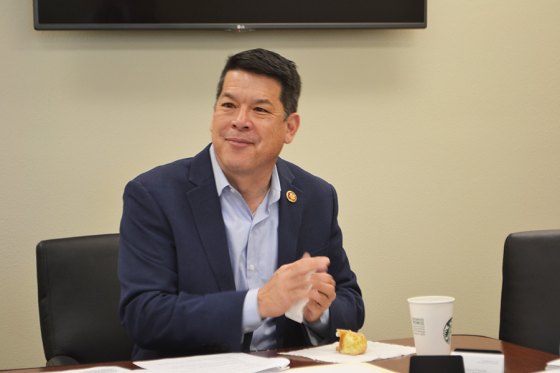The USDA provided the flexibilities at the outset of the pandemic, which were extended for one month in May and expired at the end of June. As a result, nearly 40,000 thousand seniors statewide did not receive their CSFP food package the following month due to an inability to leave the safety of their homes. In total, 41 members of the California Delegation sent a letter to Secretary Perdue asking for this extension.
“Throughout this crisis, countless men, women, and organizations in the Central Valley have stepped up to help their more at-risk neighbors by delivering food, and I am proud to have joined some of them and seen first-hand just how important it is that food delivery programs get the funding they need to keep up their vital work,” said Cox. “That’s why I am joining my colleagues to urge the USDA to extend the CSFP to ensure that those who need help the most have one less burden to worry about during this pandemic.”
“Since the start of the pandemic, I’ve joined the ranks of so many volunteers for organizations delivering meals to some of our most vulnerable citizens. Each time, I’ve heard how much these services mean to people in need, and how hard it would be to safely access nutritious food without them,” said Rep. Schiff. “That’s why we must take action to support these critical efforts, and without these waivers, seniors might be forced to choose between going hungry and putting their health at risk. This pandemic is not over, we are not back to normal, and thousands of people in Los Angeles are food insecure. We need to do everything we can to ensure that those from our most vulnerable populations don’t go hungry.”
“Earlier this year, the USDA made the Commodity Supplemental Food Program more flexible to make it easier for local food banks to work with private partners to deliver food packages to low-income seniors. Unfortunately, the USDA has allowed these common-sense rules to expire, forcing seniors to risk exposure to COVID-19 as they obtain much-needed food assistance,” said Rep. Panetta. “I’m calling on the USDA to renew these flexibilities so that our food banks can continue to serve our most vulnerable seniors safely.”

“Vulnerable seniors are most at-risk during this unprecedented health crisis. The ability for Food Banks to partner with private companies to create innovative solutions to deliver food to the most vulnerable is critical as we look to serve the community at this time,” said Gregory C. Scott, CEO, and president of Community Action Partnership of Orange County. “Food Banks need the ability to be flexible with our operations in order for us to feed those who are most at risk. The increased need, which has tripled since the pandemic began, means that our resources are stretched thin, and it is collaboration and partnership that ensures nutritious. Often lifesaving food is provided to those who need it the most. Community Action Partnership of Orange County is grateful for the USDA’s early accommodation, which ensured that California’s seniors did not have to risk exposure to COVID-19 to receive much-needed food. An extension of this accommodation would greatly help our efforts to continue to serve the most vulnerable.”
According to data provided by the California Department of Social Services (CDSS), statewide CSFP utilization for July dropped to 84,981 seniors served, down from a high of 120,500 seniors in May, representing a decrease of 30 percent. In some regions of the state, the effect has been even more devastating: the Los Angeles Regional Food Bank served 45 percent fewer seniors in July compared to June, the San Francisco Food Bank served 43 percent fewer, and the Community Action Partnership of Orange County served 34 percent fewer.
“The moment continues to call for the flexibilities the USDA had deemed necessary at the outset of the global pandemic. It is now intensified by the impact of California’s wildfires on the air quality, compounding the health risks to our seniors,” members who signed the letter. “We support the request made by the CDSS and local food agencies asking for flexibilities that will allow them to resume no-contact deliveries of CSFP food packages through private partners for the duration of the public health emergency.”
The California Delegation asked the USDA to reapprove the following flexibilities:
- Allow for the delivery of CSFP food packages to a senior’s home without identifying the recipient needed at the time of delivery.
- Eliminate the requirement for a signature at the time of delivery; and
- Eliminate the requirement that perishable cheese is included in all delivered CSFP food packages.
Cox successfully pushed for the USDA to extend the school meal waiver program that allows schools the flexibility to feed thousands in Central Valley during the pandemic.
Read the full letter here.
